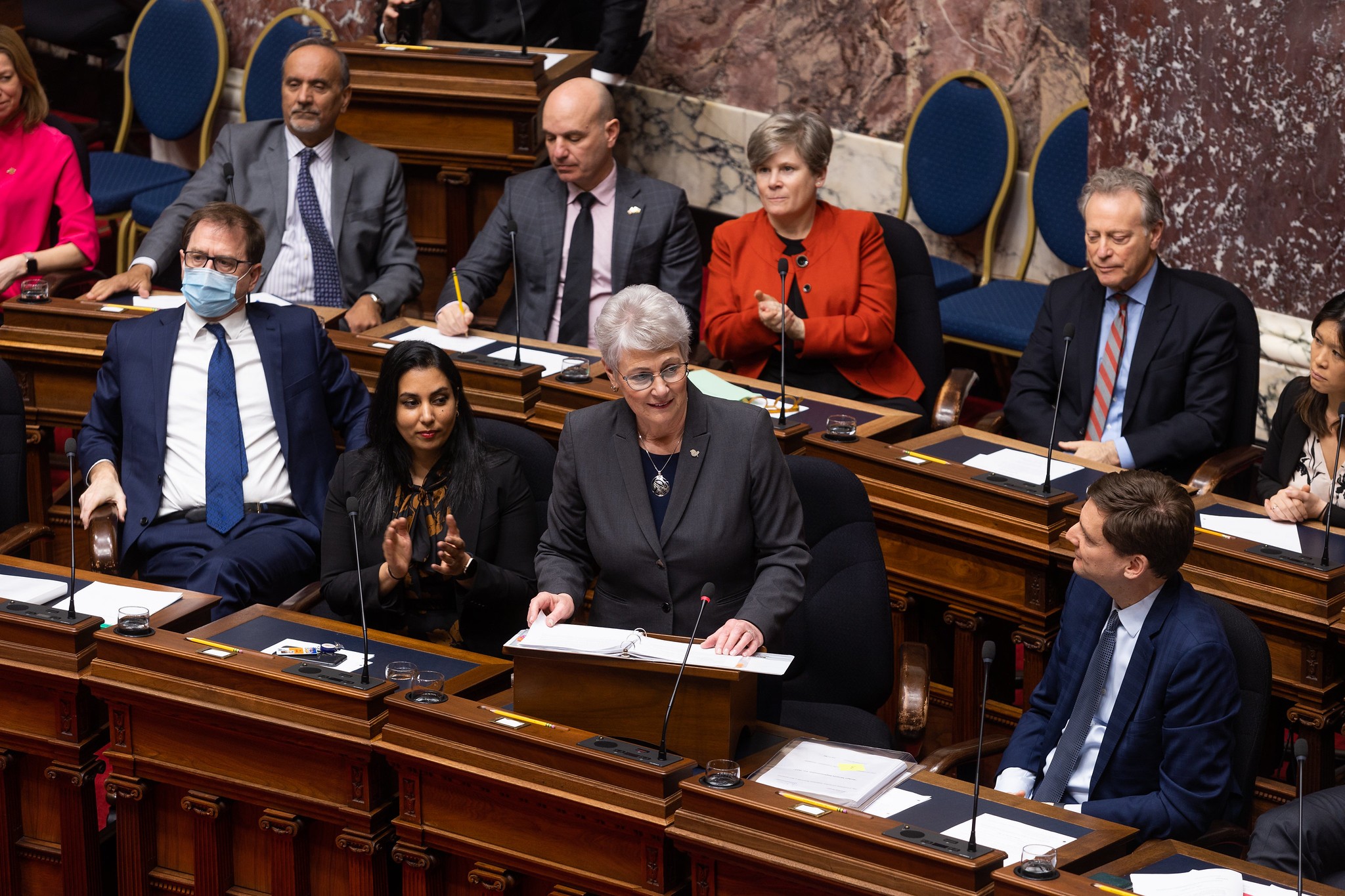B.C. construction groups give mixed reaction to budget
Prompt payment, training and the community benefits agreement were top of mind.

B.C. Finance Minister Katrine Conroy tables the 2023 budget. – Province of B.C.
Key Takeaways:
- The province is projecting a $4.2-billion deficit in 2023-24, declining to $3 billion in 2025-26.
- The budget has a refreshed housing plan with $4.2 billion in operating and capital funding over the next three years to build thousands of new homes as well as funding for new transit-oriented development.
- $480 million will be spent over three years to support Future Ready’s work to break down barriers to post-secondary training. The plan’s details are expected this spring.
- $77 million will go towards up natural-resource permitting.
- Starting April 1, 2023, the carbon tax will increase by $15 per tonne each year until it reaches $170 in 2030.
- $1.1 billion will be spent over the next three years to fight climate change by building more climate-resilient communities.
The Whole Story:
B.C.’s latest budget has been released.
The province said that it targets improving health and mental health care, creating more affordable housing, growing a clean economy and delivering more help with costs – especially for those most affected by global inflation.
“B.C. is a great place to live, but people are facing real challenges – not only from global inflation and the pandemic, but from ongoing and systemic challenges,” said Katrine Conroy, minister of finance. “This year’s budget helps protect people who can’t afford today’s high prices and takes action on the issues people care about, like finding affordable housing and accessing health care.”
Response from the province’s construction sector was mixed as many questioned if it will address the most critical issues facing builders.
BC Construction Association (BCCA)
Big spending on infrastructure did not impress the BCCA which said the construction industry is now left wondering what it means to have BC’s government in its corner.
“While we welcome the investment in infrastructure and relish the opportunity to build world-class structures that serve our communities, we know that getting it done is not as simple as adding a multi-billion-dollar budget line-item,” the group said in a release. “Funding infrastructure is important, but it isn’t a golden ticket with a guaranteed outcome. We are not building a brighter future for all British Columbians if we continue to ignore the jeopardy of BC’s more than 25,000 contractors and the 171,000 tradespeople who work for them.”
They also pointed out the province’s lack of movement on prompt payment legislation, noting that builders are working longer and harder than ever before without any guarantee that they will be paid.
“Non-payment and late payment is out of control, right alongside skyrocketing interest rates, cost of materials, and cost of labour,” wrote the group. “The result is that investment in infrastructure is becoming a catch-22 for all but BC’s largest contractors, whether open shop or union. Without complementary measures to mitigate the extreme financial risks of late or non-payment, a typical company could go broke building their share of the $4.2BN budgeted for housing. Brutal disregard of contract and payment terms plus skyrocketing costs of borrowing are bringing BC’s construction industry to the breaking point. The result is that contractors government needs might not be there to deliver.”
They called prompt payment legislation the single biggest thing government could do for construction businesses.
The group added that the industry also needs express-qualification for internationally educated and trained tradespeople, as well as faster permitting processes.
Independent Contractors and Businesses Association (ICBA)
Jordan Bateman, vice president of communications for ICBA, wrote that while government spending reached an all-time high, the provincial debt jumped to more than $100 billion for the first time in B.C. history, and $11 billion in deficits are expected over the next three years.
Bateman noted that despite higher than expected previous budget surpluses from recalculating corporate income taxes, the budget offered no tax cuts for entrepreneurs, employers and job creators dealing with escalating financial pressures.
“On the infrastructure side, the NDP touted record levels of capital spending,” said Bateman. “Unfortunately, that is in part due to the monopoly they have given their building trades union allies on several high-profile projects, which have inflated construction costs and frozen out of these projects 85% of construction workers in BC.”
Bateman wrote that the 65-year-old Taylor Bridge over Peace River was again left out of the budget, the Massey Tunnel replacement was scheduled for 2030, and there were funds targeted toward improving operations or infrastructure serving B.C. ports, a key supply chain chokepoint and as we experienced following the record floods in the fall of 2021, a major risk to our ability to trade goods.
He also argued that the province’s housing approach isn’t enough to address the housing crisis as housing starts are forecast to drop into 2024.
“Even with an infusion of government cash, housing supply is not keeping up,” he said.
While he did note that efforts to reduce natural resources permit backlogs could help potential, the ICBA would prefer they cut red tape rather than hire more bureaucrats.
“Canada generally, and B.C., has lost ground when it comes to attracting investment into our economy, which is no small reason why the national economy, according to the Organisation for Economic Co-operation and Development, is expected to be the worst performer among the 38 most advanced economies over the next decade,” he wrote. “This budget does nothing to change that, and in fact ignores the issue altogether.”
BC Building Trades
The province’s building trades unions were supportive of the budget.
“The BC Building Trades applauds Premier David Eby and Finance Minister Katrine Conroy for historic infrastructure investments in Budget 2023. The new budget commits a record $37.5 billion to capital spending over three years. That’s a $10.1 billion increase from Budget ’22,” they said on social media. “We look forward to seeing our members at work on the many crucial capital projects to come!”
Electrical Contractors Association of BC (ECABC)
ECABC President Matt MacInnis gave the budget a cautiously optimistic response.
“For Electrical Contractors Association of British Columbia’s membership, the budget is OK, and there are program-level details that will roll out over the year which are very important for electrical contractors,” wrote MacInnis in a social media post.
He praised the $37.5 billion in capital spending over the next three years across a range of project types: housing, hospitals, schools, transit – all of which will have electrical needs.
However, on the Future Ready plan, MacInnis is waiting for the details.
“Government has prioritized addressing climate change and green jobs,” he wrote. “We’re looking for a clear recognition – and allocation of resources – that electricians, line technicians and other electrical workers are foundational to British Columbia’s low carbon future. A climate change strategy will only be as strong as the expertise and workforce available to build it.
Progressive Contractors Association (PCA)
Paul de Jong, PCA president, said the province could have made better choices to protect residents and make infrastructure investments go further.
He noted that while the budget boosts capital spending to a record $37.5 billion over three years, projects are getting over budget.
“If the B.C. government is truly concerned about affordability, its labour policies should encourage competition to help reduce infrastructure costs,” said de Jong. “Scrapping the flawed CBA would go a long way in keeping project costs down, and making life more affordable for each and every taxpayer in this province.”
De Jong stated that the budget provides $480 over three years for a new skills training program that builds on the Future Ready plan. PCA supports additional funds for skills training and is hopeful there will be broad consultation before program details are announced in the months ahead.
“We look forward to providing our input on how to address B.C.’s skills shortage,” added de Jong. “Any new programs should support employers and workers through parity of esteem initiatives that help put the skilled trades on equal footing with all other academic pursuits.”

